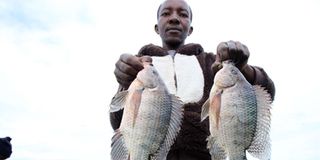Breaking News: At least 10 feared to have drowned in Makueni river
Fishy fish can kill malaria

A fisherman displays tilapia he caught using fishing line at Asembo bay in this photo taken on October 18, 2019.
What you need to know:
- Tilapia tolerate high stocking densities and poor water quality.
- They consume mosquito larvae, consequently reducing the numbers of adult female Anopheles mosquitoes.
Recently, the Kenya Marine and Fisheries Research Institute (Kemfri) banned consumption of fish from Lake Nakuru.
Announcing the ban, Agriculture Chief Administrative Secretary Linah Jebii Kilimo cited research that showed the presence of chemical elements in fish drawn from the lake that may be poisonous if consumed.
The chemicals include lead, mercury, arsenic and copper. Though in levels permissible by the WHO standards, that indicates possible contamination of the water in a lake where juicy tilapia fish thrive.
Lead can harm production of blood cells and absorption of calcium, needed for strong bones and teeth, muscles, nerves and blood vessels. Mercury can harm the kidneys and thyroid and affects the unborn. Mercury poisoning is difficult to treat.
Arsenic affects the liver, kidney, skin, bladder development and prostate, and the nervous, respiratory, endocrine, immune and cardiovascular systems. It increases the risk of cancer.
Life-threatening disease
Exposure to copper can cause liver damage, abdominal pain, cramps, headaches, dizziness, nausea, diarrhoea and vomiting.
Lake Nakuru has no outlet; hence, its many plant and animal species survive under very specific environmental conditions. Recently, two private water reservoirs broke their banks and emptied into the lake three tilapia fish species. Tilapia (cichlid fish from the coelotilapine) are mainly freshwater fish inhabiting shallow streams, ponds, rivers and lakes and, less commonly, brackish water.
Elsewhere, tilapia has invaded new warm water habitats such as Australia, but generally not in temperate climates due to their inability to survive in cold water.
Using the rapidly growing tilapia, which tolerate high stocking densities and poor water quality, to control malaria-causing mosquitoes would be a breakthrough in the war against malaria.
They consume mosquito larvae, consequently reducing the numbers of adult female Anopheles mosquitoes, the vector of the life-threatening disease.
Dr Turuthi is the deputy principal, Flamingo Secondary School





